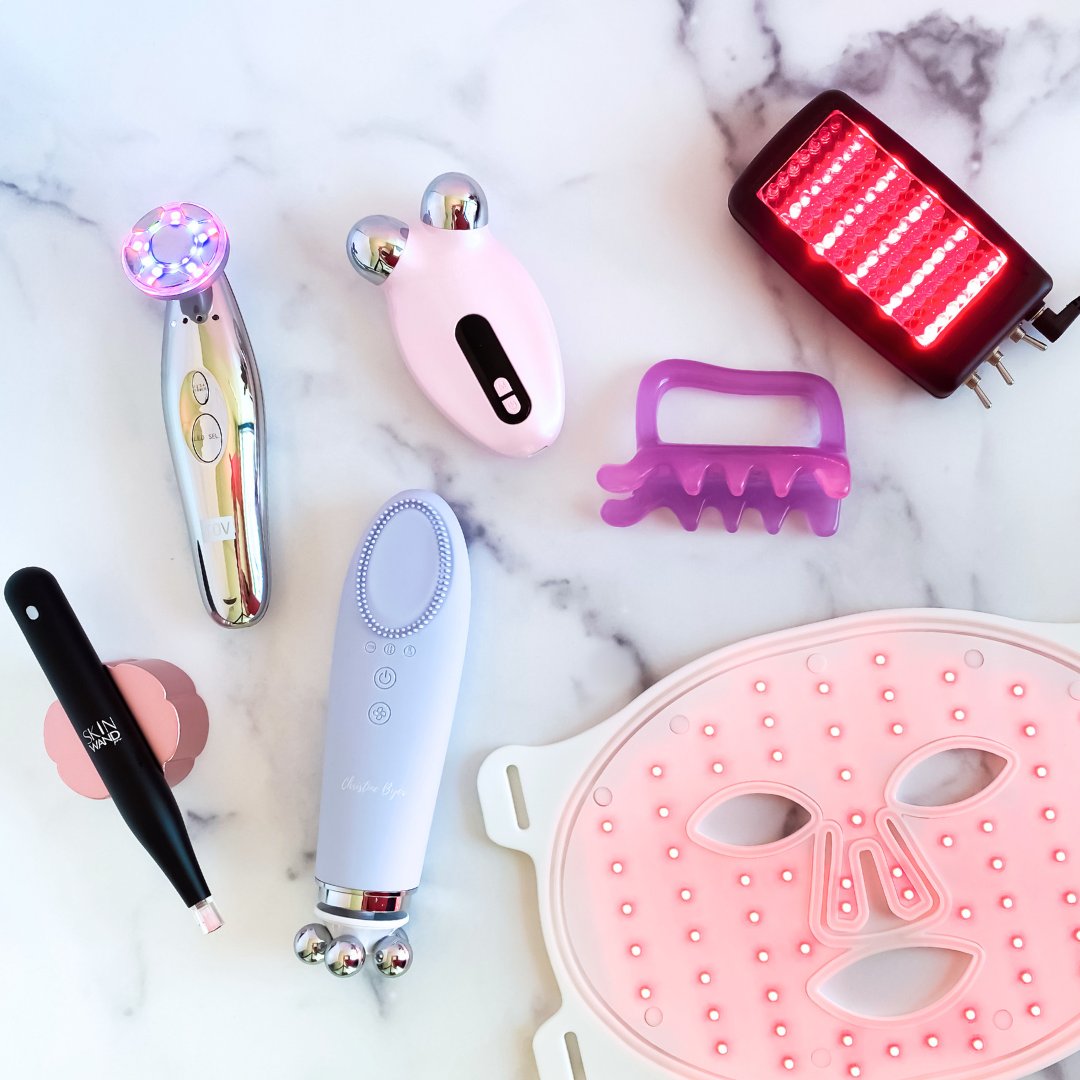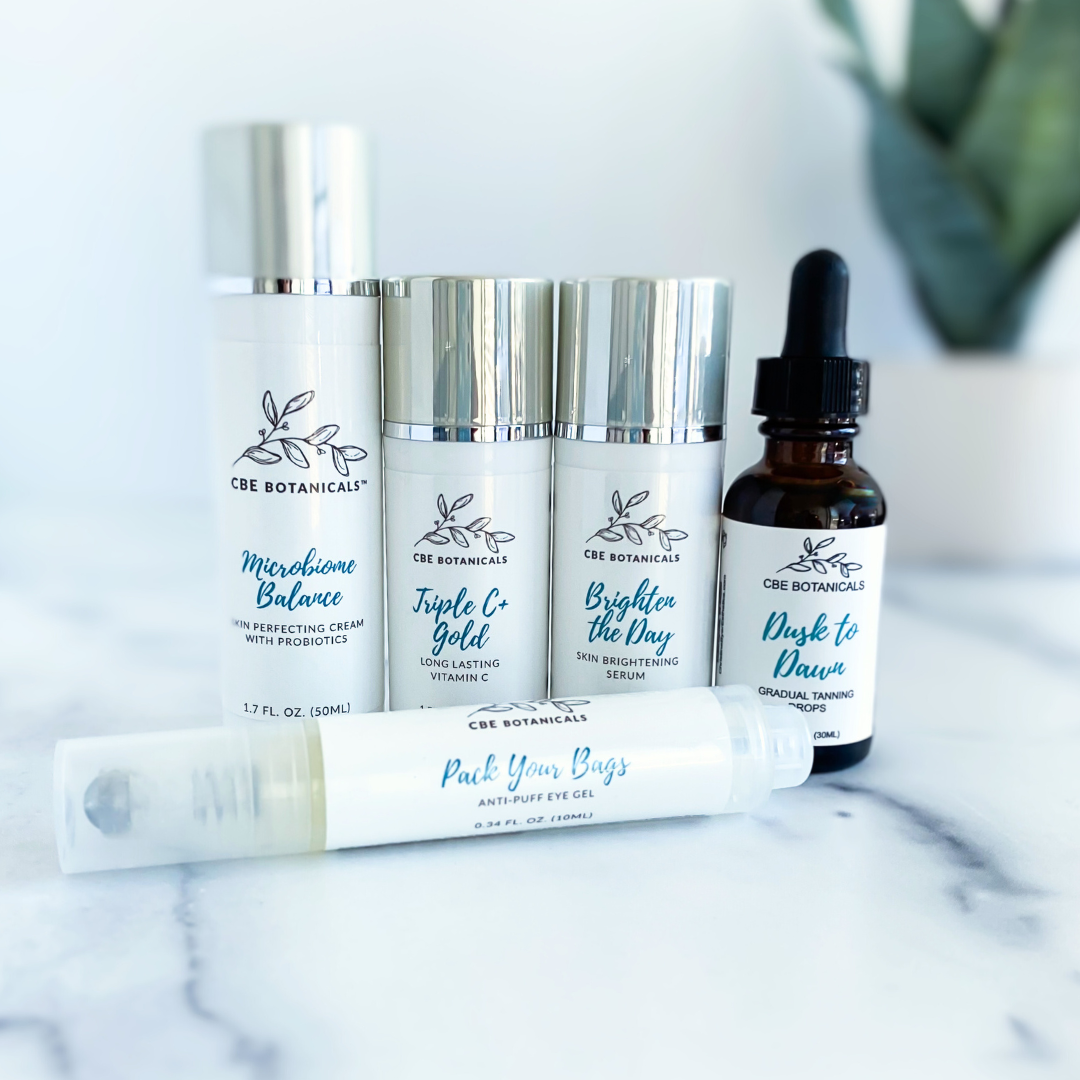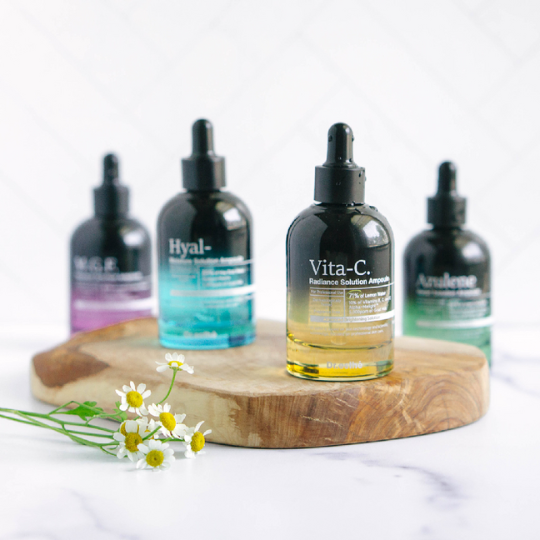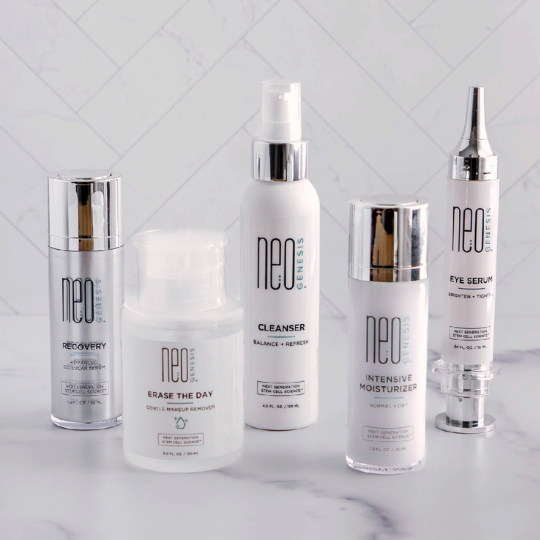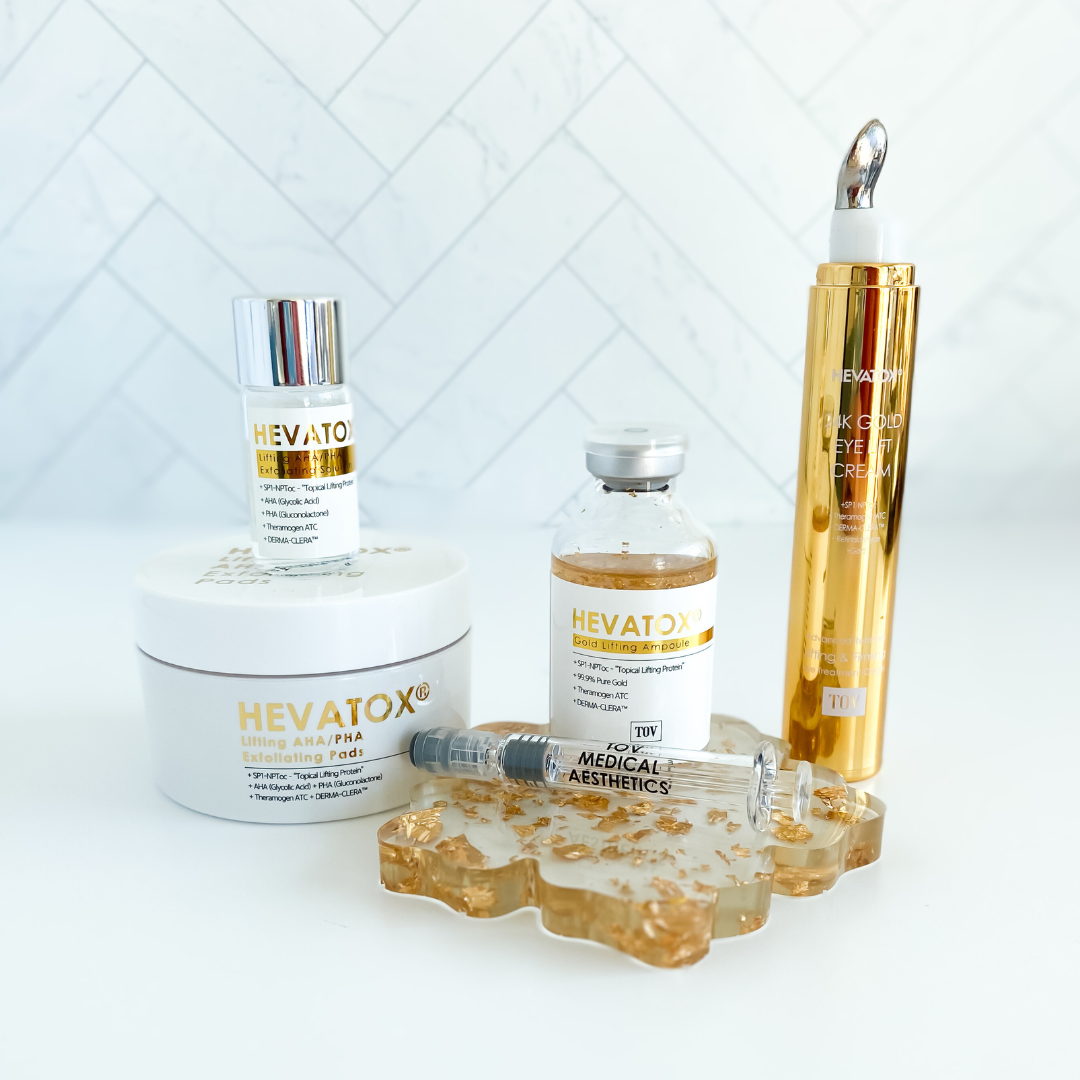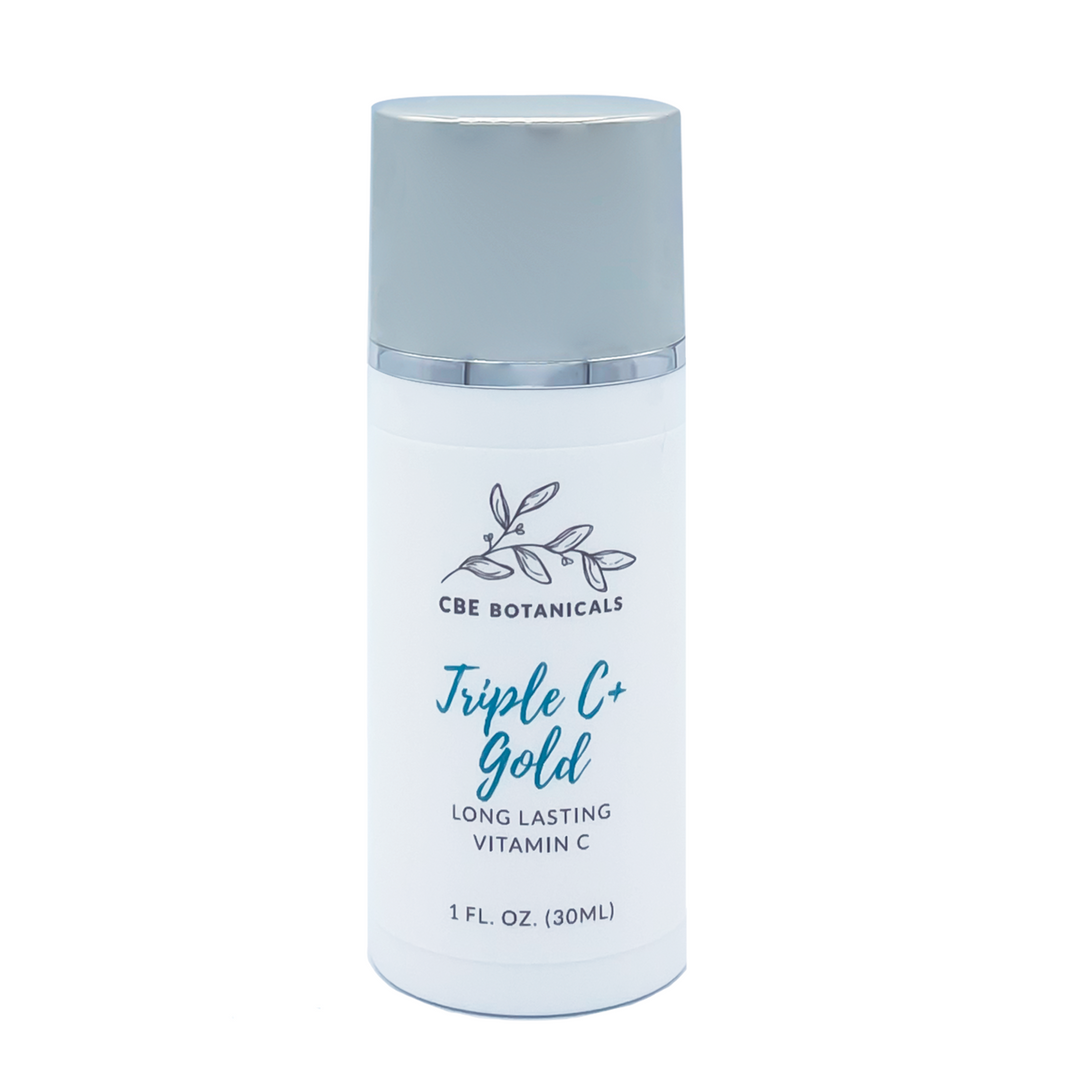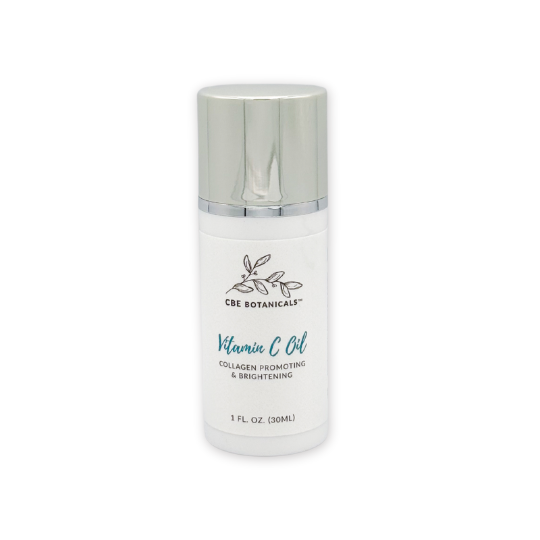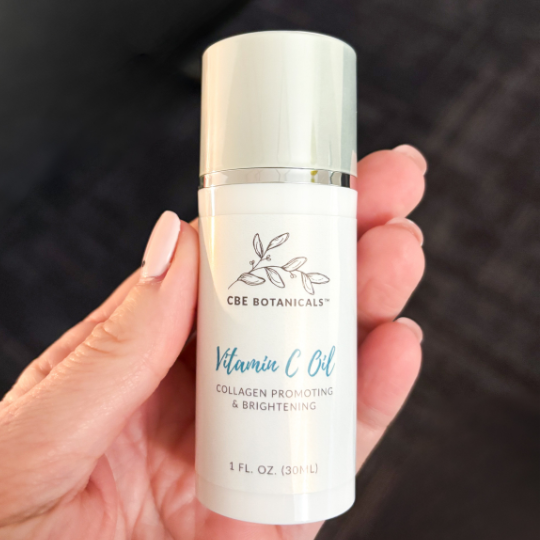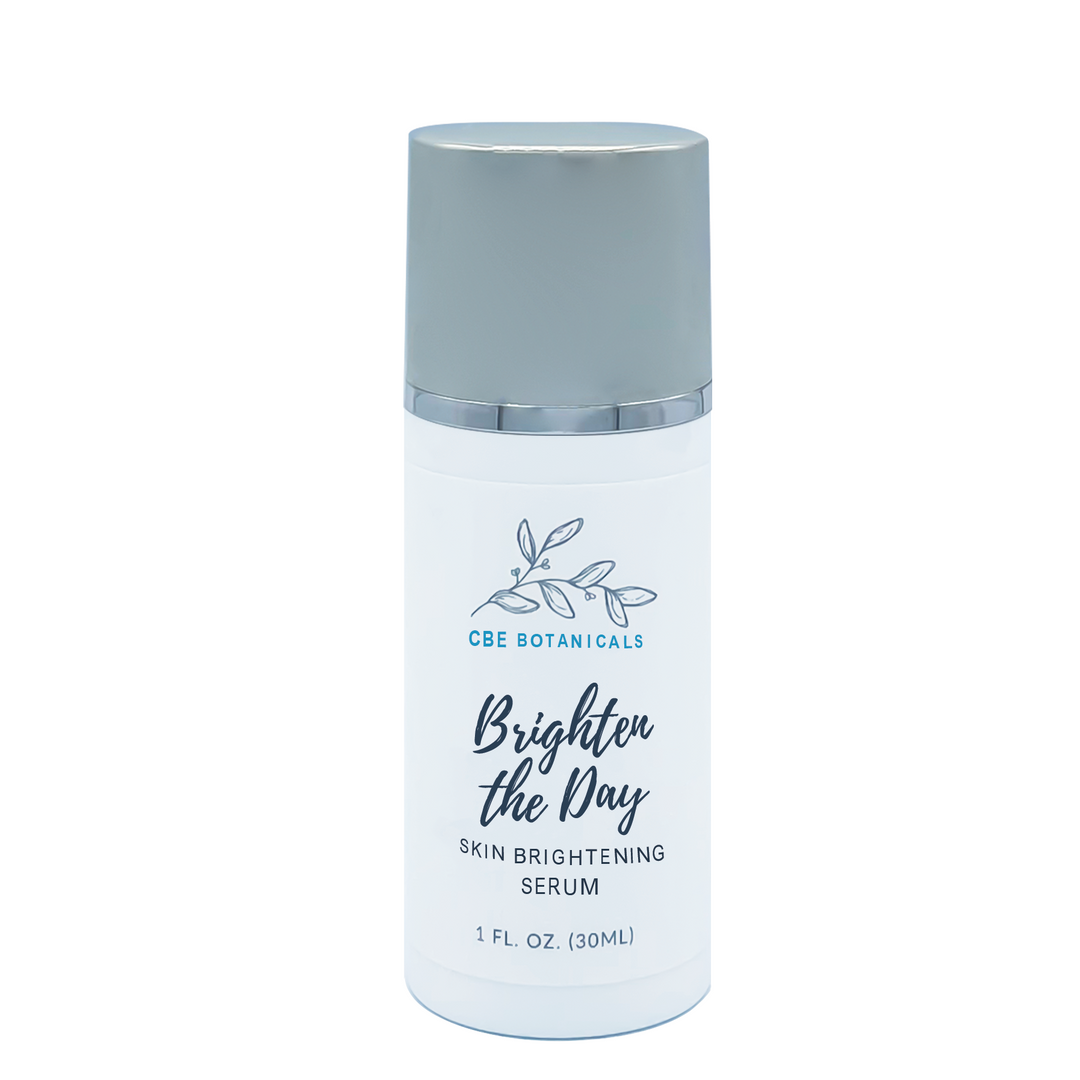Adult acne scarring, sun spots, red spots, or any type of pigmentation can leave you feeling self-conscious, especially when it’s on your face, neck, or hands. This may have you exploring your top options for fading and erasing your dark spots.
One skincare trend some turn to is taking a mega dose of Vitamin C to brighten their skin. This technique is most popular after fibroblast and other dark spot treatments. The intention is to accelerate recovery and inhibit melanin. While taking a high dose of Vitamin C when you have a cold can boost your immune response, it doesn’t work quite the same when it comes to your skin.
Brightening your skin with Vitamin C is most effective with topicals, but not all Vitamin C topicals are created equally. Here’s the gentle and effective approach I suggest to my clients, and how to cycle your brightening treatments.
Topical Vitamin C vs. Supplementation

Whether it’s from food, a supplement, injection, or IV, Vitamin C is a powerful antioxidant that delivers a range of whole-body benefits. When it comes to pigmentation, it’s proven to inhibit melanin production.
Consuming or injecting a high dose of Vitamin C provides antiaging benefits. This rapidly circulates antioxidants throughout your body through your bloodstream. However, the concentration required for maximum antiaging benefits can’t be achieved from supplementation alone.
Exercise, targeted massage, steam, and skincare treatments that stimulate circulation help deliver ingested or injected vitamins to the upper layers of your skin. For the most consistent stream of antioxidants, daily topical application is required, particularly for targeted results, such as fading dark spots.
In addition to brightening skin, topical application of Vitamin C:
-
Boosts hydration
-
Stimulates collagen synthesis
-
Minimizes sagging
-
Regenerates damaged skin
-
Reduces redness
-
Reduces under-eye circles
-
Soothes inflammation
-
Enhances product absorption
-
Firms and smooths skin
-
Protects against free radicals
-
Promotes radiance and glowing skin
Top Causes of Pigmentation
Acne and Other Scars
Scarring is a skin condition that affects us all, but some individuals scar more easily than others, and some scars fade faster than others. As your skin heals from acne, a minor cut, or any source of inflammation, your body produces more melanin during the healing process. The more significant the injury or inflammation, the more likely you are to have a lasting scar.
Hormonal Fluctuations

Although men struggle with melasma too, 90% of those exploring the use of Vitamin C for skin brightening are women. We’re most likely to develop dark spots when our hormones fluctuate. Fluctuating estrogen levels can prompt the body to produce more melanin. This can be when we start taking birth control, when we become pregnant, or when our hormones fluctuate during perimenopause. Pigmented areas may fade when hormones regulate, but for some, the dark spots remain.
UV and Sun Exposure
Few things damage the DNA of your skin more than UV rays. The sun is at the top of this list, but we’re increasingly exposed to the blue light of fluorescent lighting and electronic devices. This is why daily broad-spectrum sunscreen is required from head to toe, or other types of UV protection. The more cumulative your UV damage, the greater your risk of sun spots and dark patches.
When DNA is damaged, it stimulates melanin production as a natural defense mechanism. The melanin umbrellas over the DNA to protect the skin by absorbing UV rays, leading to sun spots. Sun spots are the type of pigmentation men are most likely to develop.
Age
Does it feel like minor skin abrasions leave darker scars than they used to? It’s not just you, it’s age. With age, collagen synthesis slows, cellular repair slows, and melanin production increases. Skin also thins, intensifying all signs of aging.
Pigmentation can develop at any age, but it increases after the age of 30. After the age of 60, 90% of adults have at least a few sun spots.
Skin Tone
If your skin tone is between 4 and 6 on the Fitzpatrick scale, you’re more likely to develop pigmentation. Especially when combined with the factors above. This includes pigmented areas that are dark brown, gray-brown, gray-blue, and black.
Types of Pigmentation Vitamin C Can Fade
-
Acne scars
-
Dark spots
-
Erythema
-
Freckles
-
Rosacea
-
Scars
-
Sun spots/liver spots
Water-Soluble vs. Oil-Soluble Vitamin C
Water-Soluble Vitamin C Serums
If you’ve tried Vitamin C serum in the past and it was irritating, it was a water-soluble formula, likely formulated from L-ascorbic acid. Water-soluble vitamins dissolve in water, but they don’t penetrate your pores. This makes them less effective than oil-soluble products. Being water-soluble, these products evaporate and lose efficacy with time.
L-ascorbic acid serums have a low/acidic pH. This makes them more likely to sting or irritate your skin.
Oil-Soluble Vitamin C Oils

This gentle and effective PM Vitamin C Oil from my CBE Botanicals line was developed to deliver the skin-brightening benefits of Vitamin C—without the irritation, even for those with sensitive skin. It features alkaline, oil-soluble tetrahexyldecyl ascorbate, a premium form of Vitamin C that easily penetrates the skin and doesn’t oxidize.
Paired with a proprietary blend of botanical ingredients, this formula works to brighten, nourish, and calm the skin—all while supporting a more even, radiant complexion.
Cycling Exfoliators and Vitamin C For Maximum Brightening
Vitamin C Oil is most effective when used consistently. For the best results, I suggest cycling your chemical exfoliators and Vitamin C topical. Cycling products keeps the skin guessing in a positive way and helps you determine what works best for you.
This video takes a deeper dive into cycling your exfoliators and Vitamin C to even your skin tone. A few quick tips are below.
Cycling Exfoliators
We don’t talk enough about exfoliation’s role in evening skin tone and fading hyperpigmentation. Melanin resides deeper in the skin’s layers, so regular exfoliation is required to ensure products are fully absorbed. As skin matures, you’ll need to utilize deep exfoliators to effectively slough away buildup. I suggest alternating between an acid exfoliator and an enzyme exfoliator.
Cycling Vitamin C

I also suggest alternating between Triple C + Gold and Serum and Brighten The Day Serum in the mornings, and applying CBE Vitamin C Oil in the evenings. These serums are my suggested alternative to prescription brighteners, including hydroquinone. They’re effective, gentle enough for sensitive skin, and you can use them long-term.
Apply Daily to Maintain Professional Skin Brightening
Vitamin C is scientifically proven to inhibit melanin production. You can expect initial brightening and hydration within the first 2 weeks of use, but it can take up to 4 months for maximum results.
To accelerate results, you can invest in at-home or in-spa LED therapy, or find an

esthetician certified in using a high-frequency electric desiccator (spot remover)—like me! These modalities take a gentle approach to evening out your complexion. You may also turn to harsher options, including prescription lightening agents, chemical peels, fibroblast therapy, IPL, and other lasers. I’m not anti-harsh treatments, but I suggest using them sparingly. Using harsh treatments too frequently may result in hard and leathery skin.
Whether gentle or harsh, follow pre- and post-treatment care. Once your skin has recovered, cycle exfoliation and Vitamin C topicals to maintain your results.
Let’s Discuss What Your Skin Needs!

Brightening your skin with a mega dose of Vitamin C isn’t effective, but the combination of deep exfoliation and gentle Vitamin C oil is.
If the tips above haven’t answered all your questions, I invite you to join the Christine Byer Beauty Club. Members access exclusive content for a deeper dive into skin conditions and proactive antiaging. This includes asking me your most pressing skin care questions.
You can begin with a 14-Day FREE trial!
The information in this blog post is intended for educational and informational purposes only and is not intended as medical advice. Always consult your physician or a qualified healthcare provider before starting any new supplement, including Vitamin C, or skincare treatment—especially if you are pregnant, nursing, or have any health conditions.


